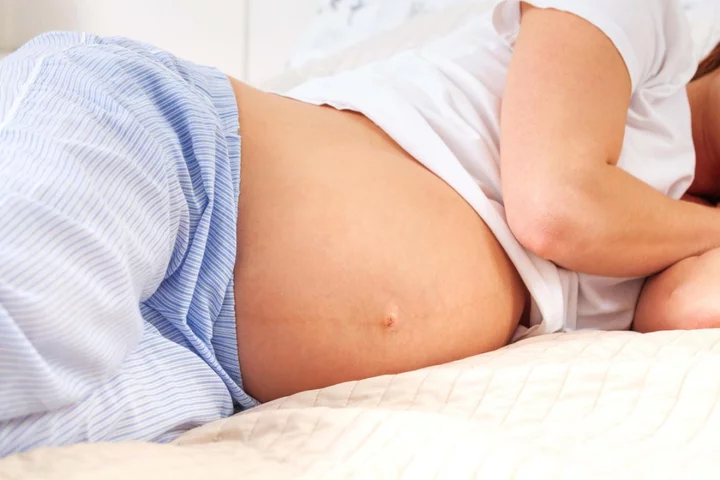
Rhythmos and Driivz Empower Utilities and Electric Fleets to Double EV Charging Capacity
BOULDER, Colo.--(BUSINESS WIRE)--Jul 11, 2023--
2023-07-11 18:22

Li-Cycle and EVE Energy Launch Battery Recycling Collaboration
TORONTO--(BUSINESS WIRE)--Jul 11, 2023--
2023-07-11 18:19

With player stylists and Gucci collabs, MLB eyes a fresh look with younger fans
Major League Baseball’s quest for the crown of cool will be on display Tuesday when its top players strut down a red carpet show at Seattle’s famous Pike Place Market ahead of the All-Star Game
2023-07-11 18:15

Ben Cohen’s ex-wife Abby says she had only ‘one symptom’ before cancer diagnosis
Ben Cohen’s ex-wife Abby has been diagnosed with cancer. The professional photographer, 44, who shares two children with Cohen, shared a video to her Instagram account documenting her experience with cancer, describing it as the “toughest yet”. In the video, Abby is seen walking into a hospital before undergoing different tests. Several clips show her in a hospital bed, wearing a stoma bag while she is surrounded by her loved ones. Writing on Instagram, Abby recalled that she visited a doctor after having experienced only one symptom. She did not specify where the cancer had been found. “This was and is the toughest yet. I’m unlucky, but lucky, to have been warned only once with a symptom of this terrible illness,” wrote Abby in the post’s caption. She thanked the NHS for “saving” her “life” and taking care of her when she was so “scared and most vulnerable”. The photographer urged her followers to “never ignore” their bodies when warning signs present themselves. “I didn’t [ignore them] and it’s given me a chance to live my new life. In time and with the right treatment, I’m hoping this WILL all be a distant memory for me,” she said. Abby and Ben share twin 15-year-old daughters, Harriette and Isabelle. In the video, the children are seen supporting their mother during her time in hospital. Their father Ben, who is a former England Rugby player, and Abby were married for 11 years before they split in 2014. Cohen went on to start a relationship with his Strictly Come Dancing partner Kristina Rihanoff, whom he was partnered up with during his appearance on the show in 2013. Ben and Kristina welcomed a daughter, Mila, in 2016. The photographer went public with her new partner, David, in 2020. Speaking to MailOnline previously, Abby said that she did not want to be known for her past relationship. “I thought, ‘Everyone still labels me Ben’s ex’ but I’m not that Abby any more. I’m me. I’ve got my two girls. My life. I’ve finally met a really nice man. I want to be known as ‘Abby the good photographer’ or ‘Abby the great mum’. I’m very different. I’m stronger,” she said. Abby has continued to praise Ben as a “fantastic hands-on father”. Read More Woman shares co-worker’s ‘infuriating’ response to her decision to not have children Buckingham Palace responds to Joe Biden’s ‘protocol breach’ with King Charles 5 late summer blooms to plant now Maria Menounos says her tumour ‘doubled’ after first cancer symptoms were overlooked How to check if you have skin cancer: Symptoms and signs to look out Jonnie Irwin makes rare red carpet appearance as he says ‘every day is a gift’
2023-07-11 17:22

Quectel Releases New 4G/5G, LPWA and GNSS Antennas to Help Customers Optimize Device Performance
VANCOUVER, British Columbia--(BUSINESS WIRE)--Jul 11, 2023--
2023-07-11 17:20

Women in certain professions ‘may be at higher risk of ovarian cancer’ – study
Hairdressers, beauticians and accountants could be at a higher risk of developing ovarian cancer, a new study suggests. Those working in sales, retail, clothing and construction industries could also carry a higher risk according to a new study published in the journal Occupational and Environmental Medicine. But the authors of the study stressed that “inferences from the results are limited” as they called for more work to examine the links between ovarian cancer risk and different occupations. The team, led by academics at the University of Montreal in Canada, examined data on 491 Canadian women with ovarian cancer and compared it with 897 women without disease. We observed associations suggesting that accountancy, hairdressing, sales, sewing and related occupations may be linked to excess risks Report authors The researchers linked occupations to ovarian cancer risk. They also compared this data to the Canadian job-exposure matrix to examine any potential workplace exposures – for example, if they are more likely to come in contact with a certain chemical while at work. After accounting for potentially influential factors, they found that some jobs may be linked to a heightened risk of disease. Those who had worked as a hairdresser, barber or beautician appeared to have a three-fold higher risk. Meanwhile, women who worked in accountancy for a decade were twice as likely to develop the disease while construction workers were almost three times as likely. Shop assistants and sales people had a 45% increased risk while those who make or alter clothes appeared to have an 85% increased risk. The researchers said that those found to have a higher risk were also more likely to be exposed to a number of “agents” including: cosmetic talc, ammonia, hydrogen peroxide, hair dust, synthetic fibres, polyester fibres, organic dyes, and pigments and bleaches. “We observed associations suggesting that accountancy, hairdressing, sales, sewing and related occupations may be linked to excess risks,” the authors wrote. “Further population-based research is needed to evaluate possible hazards for female workers and occupations commonly held by women.” In a linked editorial, academics from the National Cancer Institute in Maryland in the US, point out that women are under-represented in “occupational cancer research studies”. They said the study “reminds us that while the lack of representation of women in occupational cancer studies — and indeed, even potential strategies to address this issue — have been long recognised, there is still a need for improvement in studying women’s occupational risks. “By excluding women, we miss the opportunity to identify risk factors for female-specific cancers, to evaluate whether sex-specific differences in risk occur, and to study exposures occurring in occupations held primarily by women.” Commenting on the study, Kevin McConway, emeritus professor of applied statistics at the Open University, said: “The researchers clearly state that their study was ‘exploratory’ and that it is ‘aimed at generating new hypotheses’. “So, it is certainly not claiming that they have definitely found occupational groups, or exposures to chemicals and other agents, that are associated with ovarian cancer. “Even less are they claiming that being in certain occupations, or being exposed to certain chemicals at work, causes an increased risk of ovarian cancer. “Instead, they aimed at suggesting occupational groups, and agents to which women might be exposed at work, that possibly might be associated with ovarian cancer risk, and they say clearly that further research is needed to ‘give a more solid grounding’ to any conclusions that might be drawn about associations between what women do at work and their risk of getting ovarian cancer.” Read More Charity boss speaks out over ‘traumatic’ encounter with royal aide Ukraine war’s heaviest fight rages in east - follow live Beekeeping has gone viral – but how easy is it? Everything you need to know about sleep in pregnancy Myleene Klass: Government does not deserve power if miscarriage policy unchanged
2023-07-11 16:52

NeuroSolv Therapeutics Developing Spinal Cord Injury Therapy, Seeks Clinical Trial Investment
DUBLIN--(BUSINESS WIRE)--Jul 11, 2023--
2023-07-11 16:45

More than $2 billion committed at UK-US climate finance forum
LONDON (Reuters) -Finance leaders, companies and philanthropists have committed more than $2 billion to help finance efforts to reduce carbon
2023-07-11 16:29

Everything you need to know about sleep in pregnancy
Sleep matters at the best of times, but when you’re growing new life, getting a good night’s rest is incredibly important. But, pregnancy and sleep do not often go hand in hand. “Many people experience changes in their sleep patterns and quality during pregnancy,” says Dr Chun Tang, medical director and GP at Pall Mall Medical in Manchester. “Hormonal fluctuations, physical discomfort, frequent urination and anxiety can contribute to sleep disturbances. Some people may find it more challenging to fall asleep or stay asleep throughout the night, leading to altered sleep-wake cycles and a disrupted circadian rhythm.” Your circadian rhythm will change “During pregnancy, the circadian rhythm, which is the internal biological clock that regulates various physiological processes, undergoes certain changes,” says Tang. “Things like hormonal changes, sleep disruptions, changes in activity and energy levels and increased sensitivity to light, can affect your circadian rhythm.” Warmer body temperature “During pregnancy, basal body temperature (the body’s resting temperature) tends to be slightly elevated, due to hormonal changes, particularly increased levels of progesterone,” he explains. “This can result in a feeling of warmth or increased body heat. Higher basal body temperature can make it uncomfortable to sleep, especially in combination with external factors, like warm weather or a warm sleeping environment.” Some people may also experience night sweats, particularly during the later stages of pregnancy, Tang notes. “Night sweats are episodes of excessive sweating during sleep, which can lead to discomfort, disrupted sleep, and difficulty falling back asleep. Hormonal fluctuations and increased blood flow during pregnancy can contribute to these. “Hormonal changes during pregnancy can also trigger hot flushes, sudden feelings of intense heat and sweating that typically affect the face, neck, and chest. Hot flushes can occur during the day or at night, affecting sleep. But if you have a persistent fever or feel unwell, you should consult your GP,” he says. Vivid dreams “There have been numerous reports of people having more vivid dreams during pregnancy. Hormones, increased emotional sensitivity, and changes in sleep patterns can contribute to the intensity and frequency of dreams,” says Tang. “Pregnancy often brings about a range of emotional and psychological changes. Heightened emotions, anxiety, excitement, and anticipation can influence the content and intensity of dreams. Dreams may reflect the concerns, hopes, and fears associated with pregnancy and impending motherhood. “If vivid dreams are causing distress or affecting sleep quality, practising good sleep hygiene and relaxation techniques before bed may help promote better sleep. Maintaining a comfortable sleep environment, establishing a regular sleep routine, managing stress levels, and seeking support from healthcare providers can also be beneficial,” he adds. Physical discomfort Getting bigger may not be comfortable, particularly in the later months. As the pregnancy progresses, physical discomfort and increased fatigue may affect activity levels. Some people may experience increased daytime sleepiness, while others may find it harder to engage in physical activities, due to the changes associated with pregnancy. “The third trimester can present more pronounced sleep challenges, due to the changes and preparation for labour. Some common sleep difficulties during this trimester include discomfort and difficulty finding a comfortable position, frequent urination, heartburn or reflux, and restless leg syndrome,” Tang says. What can help? Yoga can be beneficial, suggests Tang: “Prenatal yoga is specifically designed to support the physical and emotional wellbeing of expectant mothers throughout their pregnancy. It involves gentle stretching, deep breathing exercises, mindfulness practices and relaxation techniques tailored to the needs and safety considerations of pregnancy. “These practices can be valuable for managing anxiety, promoting better sleep, and fostering a sense of calm and balance during pregnancy.”
2023-07-11 16:26

Move Over Y2K, Get Ready for ‘Comfortcore’: British Women Are Prioritising Comfort More Than Ever, but Not at the Expense of Style
LONDON--(BUSINESS WIRE)--Jul 11, 2023--
2023-07-11 16:17

Myleene Klass says government does not deserve power if miscarriage policy unchanged
Myleene Klass has said that if the government does not implement changes to the way woman are treated following miscarriages then it no longer “deserves power”. The former Hear’Say singer met with the Minister for Women’s Health, Maria Caulfield, on Monday (10 July) at the Tommy’s National Centre for Miscarriage Research in Birmingham. Klass, who had previously been outspoken about her four miscarriages, organised the visit at the pregnancy charity’s centre – located in Birmingham Women’s Hospital which also contains an early pregnancy unit – alongside Labour MP Olivia Blake. The 45-year-old presenter urged the government to make sure women receive medical intervention after every miscarriage, not just three, 24 hours specialist care and support for pregnancy and for data to be collected to understand the scale of the issue. According to the NHS website, if a woman has had three or more miscarriages in a row then further tests will be given to understand the cause. Klass told the PA news agency that a soon to be published pregnancy loss review, which looks at improving NHS gynaecology and maternity care, could provide a “massive” change if implemented. She said: “If the policy (does) include these changes, the face of women’s health care is going to change unrecognizably and it will be a wonderful time for our children and our children’s children to know that we made a movement happen that actually protected women’s health.” When asked how she would feel if there are no changes, Klass said: “A health secretary and a health department and a government that doesn’t look after the people, that is in a position and empowered to do so, doesn’t deserve to hold (onto) that power.” The mother to daughters Ava and Hero and son Apollo said she has been “very frustrated” after a “real David and Goliath” battle with the government. She said: “I do find that women’s health is so far down on the agenda and it’s so misogynistic as to why it really is, from the tablets we are given to take, all the way through to the treatment that we receive, or rather the lack of treatment that we receive. “I think it’s pretty evident that we were told to just put up and shut up and that is not the world that we live in anymore.” Klass added that care for women going through miscarriages is not addressed as it is “taboo” and “makes people uncomfortable”. She said: “It’s so cruel when you have experienced the process of it, I’ve never done so much paperwork. “A little baby that never existed and yet the paperwork is excessive and you’re asking a woman to sign away… what do they refer to it as? The products of pregnancy, even our paperwork is incorrect.” Klass also said that the difference between women receiving care in an early pregnancy unit are a “lottery” as in certain parts of the country the centres can be closed during certain hours and at the weekend. She added: “So this is something that is actually costing the economy more, because people are being sent to the wrong places and really desperately suffering with their PTSD.” Klass said that one treatment, a steroid hormone called progesterone, should be administered to more women at risk and GPs should receive more training about the drug. Klass said: “If there is still a heartbeat and you’re bleeding (and) you are given progesterone, you’ve got a chance, I know this better than anybody because that’s how I had my son. “Can you imagine if you do suffer a miscarriage you sometimes or very often have to wait for your GP to then sign you off to get the secondary scan? That means… you have to wait to have your baby removed.” Klass said she hopes things have “shifted” after Caulfield’s visit. In a statement, the minister said the work done by Tommy’s is “so important” as pregnancy loss can be “hugely devastating and traumatic” and thanked those at the centre for sharing their stories. Caulfield said: “I’ll keep working to ensure women and their families can access the best possible care following complications in pregnancy. “The independent review into pregnancy loss – the findings of which will be published shortly – will consider how we can improve care so women and families receive the support they need.” Read More It took until my thirties to realise I might not be white Woman exits plane after tirade about passenger who is ‘not real’: ‘I’m not about to be Final Destination-ed’ ‘We call them Picky Bits’: Nigella Lawson responds to viral ‘Girl Dinner’ trend Charity boss speaks out over ‘traumatic’ encounter with royal aide Ukraine war’s heaviest fight rages in east - follow live
2023-07-11 15:23

NeuroSolv Therapeutics Developing New Therapy to Treat Spinal Cord Injury, Partners With AscellaHealth to Bring Therapy to Market
DUBLIN--(BUSINESS WIRE)--Jul 11, 2023--
2023-07-11 15:17
